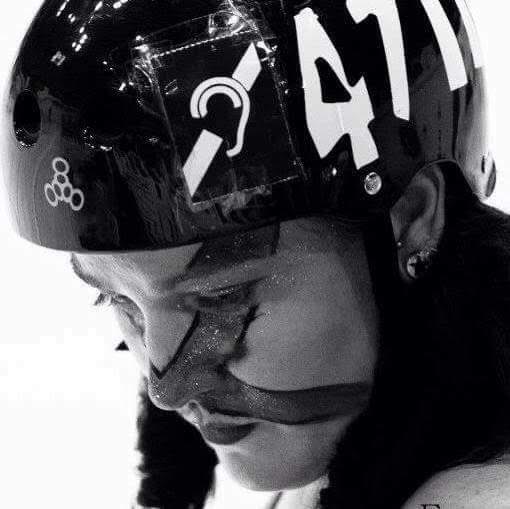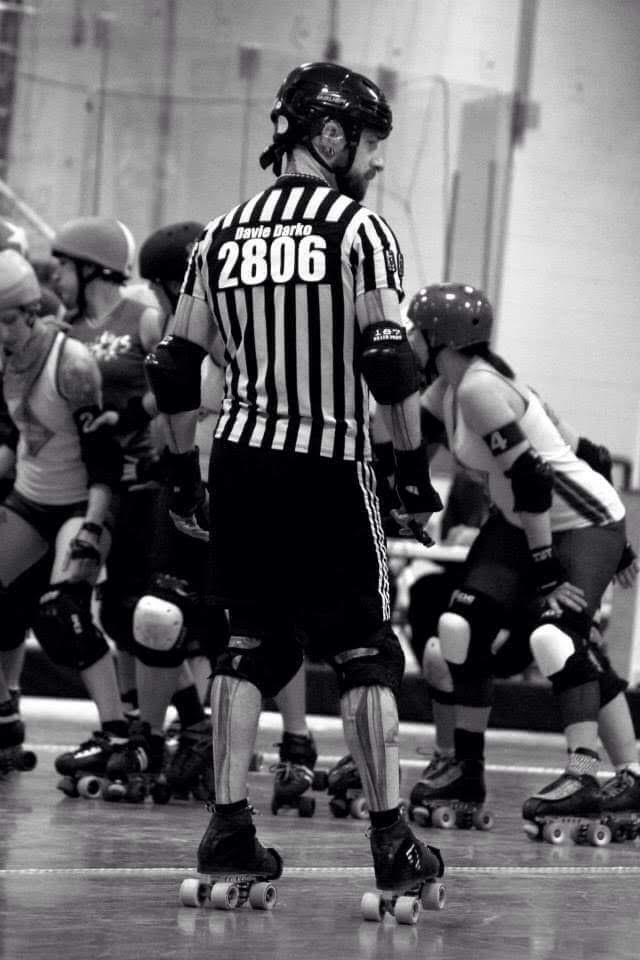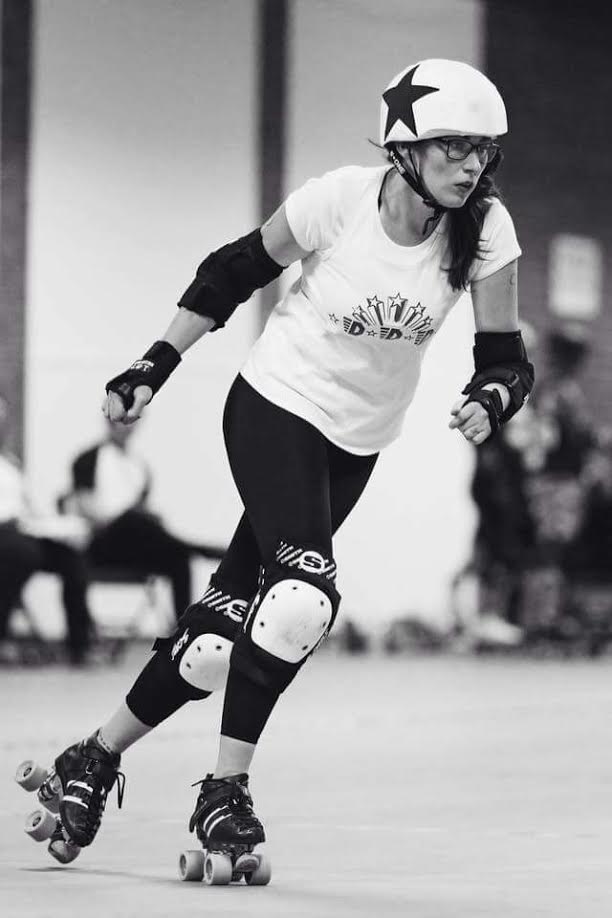An Interview With: The Deaf and Hard of Hearing Roller Derby Skaters Worldwide Community Group
While Roller Derby tries its hardest to be an accepting place, it is sometimes hard for a majority population to understand the needs of a minority, and the actions of individuals can always fall below the standards the community may aspire to. This was highlighted last year, when Meat Train was not placed in the New Zealand National Women's Derby squad, apparently due to concerns that as a hard of hearing individual, it would be too hard to accommodate her into the training routine.
One of the consequences of the outcry over this was the foundation of the Deaf and Hard of Hearing Roller Derby Skaters Worldwide Facebook group, in order to promote and support deaf and Hard of Hearing skaters in roller derby. (At this point, a brief aside is necessary on terminology: when used with a capital D, "Deaf" is used to identify as a member of the Deaf community; as opposed to "deaf", which refers to the medical state. A HoH (Hard of Hearing) person may also identify as Deaf if they are part of the community, despite not being "medically deaf". )
The community recently got some wider attention in the UK when UK rep (and Doonhame Derby Dolls skater) Firefoxx was filmed by BBC SeeHear when attending a bout down in Bristol.
We took the opportunity to ask some questions of the current team behind the Deaf and Hard of Hearing Roller Derby Worldwide Facebook group. Our interviewees are: Meat Train (also known as Marcia), her (Hearing) partner Lex, referee Davie Darko and Firefoxx. Meat Train skates for Whenua Fatales Roller Derby/ Hutt Valley Vanguard Roller Derby, New Zealand and is HoH going deaf, Davie Darko referees for Roc City Roller Derby and is HoH, and Firefoxx skates for Scotland's own Doonhame Derby Dolls and identifies as Deaf. Firefoxx is sponsored by Skates.co.uk.
 Meat Train (photo by Emear O'Connell) Meat Train (photo by Emear O'Connell) |
 Lex Lex |
 Davie Darko (by ?) Davie Darko (by ?) |
 Firefoxx (by Graeme Willets) Firefoxx (by Graeme Willets) |
I believe that the Deaf and Hard of Hearing Derby Skaters Worldwide FB group and community was founded after the incident in during New Zealand's National Team selection involving discrimination against Meat Train for being Deaf. Were you as skaters surprised by this event?
MT: I was very surprised that my hearing loss was taken into consideration and plastered on social media. I was deaf at the start of the year when I got picked for the top 30 and everyone knew that. I feel that with the mindset that enabled this to happen I never had a hope of making the final team. This is not ok for New Zealand Roller Derby and this is not ok when picking a national sports team.
L: I felt ill…and then furious. I knew that it was not okay. It has been a very intense 9 months since then and it has been gut-wrenching to see how it has affected Marcia. There has been so much support for her worldwide and our decision to start this page has helped so much with turning this whole thing into something positive. We have worked tirelessly on the Deaf and HoH Roller Derby Skaters Worldwide page, all with the aim of making sure that this does not happen again to anyone.
What has the community been doing to make things better for D/HoH skaters in the months since it was founded?
L: There are so many things! From derby promo videos in sign language to how much love we see coming to each and every person we profile on the page from their teammates… We have had MANY people contact us saying “we have a Deaf or HoH person in our League – how can we support them?” – it’s wonderful
The impetus for this interview was the discovery that Doonhame's Firefoxx was representing Scotland and the Deaf community in Bristol, to be filmed by See Hear. Can you talk a little about how you got involved in this, and what the experience was like?
MT: Firefoxx was one of the 1st skaters profiled on our page. When we were contacted by the BBC looking for a Deaf/ HoH skater in the UK we put them in contact with her as her profile had been very popular and she was one of the only UK-based derby people we knew at the time.
L: As Marcia said, the BBC got in contact with us and we pointed them in Firefoxx’s direction It was very exciting in the few days leading up to the filming as we decided to pull together a ‘good luck video’ for her and her teammates (as it was their cherry popper!) from derby people from all around the world! We spent a crazy few days calling in favours, filming our own message, editing and getting the vid to the BBC in time to surprise the Doonhame Derby Dolls before the bout. It was bloody intense but so worth it!
There are, of course, many sign languages, which are very different in vocabulary and grammar. Do any of you know more than one Sign Language, and if so, are any better suited to derby than others?
MT:New Zealand Sign Language is very similar to British Sign Language. I find NZSL easy to use on the track as we’re not signing whole sentences, just signs for different plays.
L: No, only basic New Zealand Sign Language but we really need to learn some American Sign Language to be better able to Skype call with the ASL users we meet through our page!!!!!
D: Unfortunately I don't know any sign language, but I'm seriously considering ASL, given my deteriorating hearing and of course where I live.
FF: [I'm] currently learning [British] sign language and enrolling in advanced classes soon.
As with any language which the majority do not speak, are there advantages to having a Sign Language as a language (and teaching your teammates it)?
MT: I’m still learning sign as I’m going deaf and it is now my second language. Using sign is an advantage as the other team have no clue what you’re about to do. It helps make sure everyone knows what play we are about roll out, without telling the opposition. And at a derby game it’s so loud who can hear much anyway? New Zealand Sign Language is very similar to British Sign Language. I find NZSL easy to use on the track as we’re not signing whole sentences, just signs for different plays.
L: Absolutely. Sign Language can be seen from a distance so you can communicate across a track, even in the middle of a drill or from the bench. As someone in the audience I often get signed at from the bench (can you fill my water bottle/ I’ve hurt my _________ or what was that penalty for? LOL)
There's a lot of advice on the FB page for skaters and officials concerning support of Deaf and Hard of Hearing skaters, including the provision of signing translators for bench teams, and dealing with insubordination calls. What've been the most common issues, and the best responses to the issues that you face as D/HoH skaters?
MT: There are Leagues around the world trying to understand, trying to help and holding events that are inclusive but like anything it takes time and a willingness to try.
D: In my experience as an official (and from that point of view), the most common issues I've seen are skaters knowing when they are receiving a penalty or penalty warning from a referee, or receiving instructions from penalty box staff. However, these are well-known issues, and for teams that have a Deaf or HoH skater, they usually already know how to handle it. It is brought up early before the game starts, and procedures are put in place to better enable communication between skaters and officials.
FF: The biggest barrier I've faced is the communication between myself and officials. Being on track, not being able to hear what is happening around you and having that inner panic incase you miss a ref call or something is a really isolating feeling. It's literally like skating around in your own little bubble. I rely heavily on the officials to immerse me fully into the game. The biggest challenge we face is educating all the officials out there on how to communicate effectively with the deaf and HOH.
Is it easier, do you think, to be HoH or deaf when playing derby, and are there more similarities than differences?
MT: I think so, yes, but then I don’t have anything to compare it to. It’s what I know, my way of being in the world… I don’t get distracted by other stuff like the crowd, people talking smack talk, the commentary. On the other hand if there is music when I’m jamming it puts me at a disadvantage as I can’t hear the whistles and end up starting later than the other Jammer (I always have to watch the hand signal of the Jam Timer). The music is what I hate the most.
L: I can’t speak FOR the Deaf or HoH people involved in derby as I am not one of them. I can say that one of the most common things that comes through the page is that people who are hard of hearing are often struggling with where they fit in derby. We have seen some amazing improvements in people’s confidence to ‘come out’ to their Leagues and speak up for what they need. This doesn’t always happen though and we have seen some people walk away from derby because it’s just too hard to keep asking for a few accommodations that would make all the difference. That always breaks our hearts and this is one of the main reasons why we created our resources (for skaters, for officials, for leagues and for fans).
D: I can't speak to what is easier or harder, but as a HoH official, I can certainly attest to the challenges that are faced. For us, audible signals are a must for certain things. For example, as a Jammer Referee, there are decisions you have to make that depend upon the state of the pack and where the Engagement Zone is, and if you have trouble hearing the pack definition or in/out of play status from the Inside Pack Referees, you could be missing critical information and make the wrong call. Luckily my hearing aid has helped me in this regard.
FF: I honestly completely underestimated how hard this game would be as a deaf skater. Not only do we have to use our individual talent on talent and perform exceptional teamwork - we have to essentially find a way to bring that all together; but without any hearing. I think if people could truly understand how it feels to be a deaf person in a hearing sport; they'd quickly change the way of the game. It's hard, but my love for the sport makes it worth it.
If you could pick one thing which is the most important aspect to do right to support D/HoH skaters in derby, what would it be?
MT: Facing the Deaf/ HoH person when you are talking to them. The hardest part of derby is the training, not so much the games. It’s in training that coaches roll around to talk so you can’t always see their face and what they’re saying. At the same time other skaters are often fixing their gear up (velcro, stomping their skates) or talking over top of the coach or just chatting to their friends and that makes it hard (or impossible) to hear what the coach is saying. Facing us means we have a much better (but not 100%!) chance of lip-reading or hearing what you are saying! Also, it’s nice to know you’re not alone when you feel like you don’t fit.
L: Be welcoming to them. Don’t make them feel like a burden or too-hard to deal with. You could be missing out on your next star Jammer or Blocker/ an amazing new friend xx
D: Derby is the people. As such, I think the most important thing is to learn how we can best understand and support each other through inclusivity and open, honest, and patient communication.
FF: Be patient. We're trying really hard to keep up with you. If you give us a little time, we'll be a true asset to your team. We may not be able to hear you but we'll make up for it with our incredible determination.
